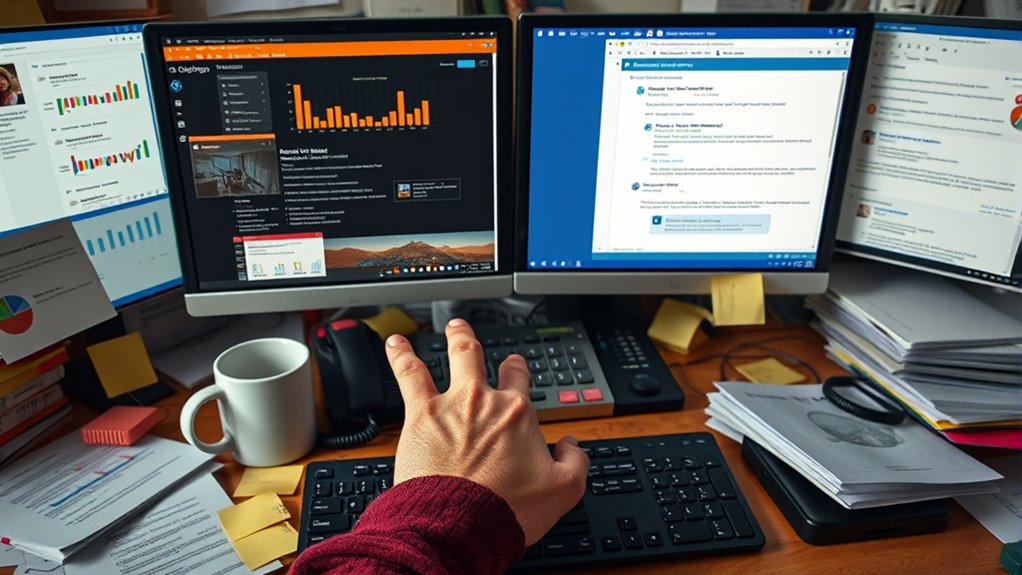Switching between tasks divides your focus and increases your cognitive load, making your brain work harder to manage each shift. This mental juggling causes mistakes, delays, and mental fatigue, ultimately decreasing your productivity and quality of work. Every switch demands mental reorientation, which wastes time and drains your energy. If you want to understand how to minimize these costs and boost your focus, you’ll discover effective strategies that can make a difference.
Key Takeaways
- Context switching increases cognitive load by requiring mental readjustment, which consumes valuable cognitive resources and time.
- Frequent shifts fragment focus, making it harder to maintain deep concentration and increasing the likelihood of errors.
- Each switch causes mental recalibration, wasting time and reducing overall productivity and efficiency.
- The added mental effort from switching accelerates mental fatigue, impairing decision-making and task performance.
- Minimizing context switches helps preserve cognitive resources, enhancing focus, accuracy, and overall work quality.
How Our Brain Handles Multiple Tasks

Your brain doesn’t truly multitask; instead, it rapidly switches focus between tasks. This misconception, part of multitasking myths, makes you believe you’re doing multiple things simultaneously. In reality, your brain is experiencing distraction dynamics—shifting attention so quickly that it feels seamless but isn’t efficient. Each switch demands cognitive resources, causing a mental cost as you reorient your focus. When juggling tasks, your mind isn’t processing them equally; instead, it’s dedicating effort to alternation, which hampers overall productivity. This constant toggling leads to mistakes, forgetfulness, and slower completion times. Recognizing these distraction dynamics helps you understand why multitasking feels productive but often isn’t. Instead of spreading your attention thin, focusing on one task at a time minimizes the negative effects of task switching. Understanding the Best Modern Toilet design and mechanisms can serve as a metaphor for efficient task management—just as a modern toilet minimizes water waste through innovation, focusing on single tasks reduces mental waste and improves overall flow. Additionally, cognitive load increases significantly with frequent task switching, further impairing your ability to perform effectively. Being aware of distraction dynamics and how they impact your mental resources can also help in recognizing the importance of focus and identity in task management.
The Science Behind Cognitive Load

Your brain manages mental effort through dynamic processes that influence how much you can handle at once. Working memory has strict limits, so overloading it causes mistakes and delays. To stay efficient, your attention must be carefully allocated between tasks, balancing focus and distraction. Cultivating spiritual energy through mindfulness and meditation can also enhance mental clarity and resilience, making it easier to manage cognitive load effectively. Recognizing narcissistic traits in oneself or others can help in adjusting focus and setting healthy boundaries to reduce unnecessary mental strain. Additionally, understanding cognitive load theory can inform strategies to optimize mental resources and prevent overload, as research shows that managing creative practice can significantly improve problem-solving capacity. Developing awareness of comfort solutions for sofa beds can also contribute indirectly by improving rest and overall mental well-being, reducing cognitive stress.
Mental Effort Dynamics
Understanding mental effort dynamics is essential because it reveals how your cognitive resources are taxed during task switching. When you shift focus, neural synchronization temporarily falters, disrupting the smooth coordination of brain regions responsible for processing information. This misalignment increases mental effort as your brain works harder to reestablish harmony. Over time, maintaining cognitive resilience becomes challenging, as frequent switching depletes your mental energy faster. Recognizing these dynamics helps you understand why some tasks feel more effortful than others, especially when switching frequently. By managing task progressions more deliberately, you can preserve neural synchronization and support your brain’s capacity to handle cognitive load efficiently. Additionally, advancements in neural network integration are helping researchers develop strategies to mitigate these effects. For example, understanding how cognitive load impacts mental effort can guide you in designing better workflows that minimize unnecessary task switching. Incorporating credit card insights into decision-making processes can also help streamline tasks and reduce mental strain. Moreover, applying spiritual guidance concepts such as mindfulness can help you stay focused and reduce the cognitive costs associated with distraction. Being aware of the Law of Attraction principles can also aid in maintaining a positive mindset, which is essential for mental resilience. Ultimately, understanding these processes enables you to optimize your mental effort and sustain focus under demanding conditions.
Working Memory Limits
Working memory acts as a mental workspace where you temporarily hold and manipulate information needed for complex tasks. Your cognitive capacity is limited, typically handling about four to seven pieces of information at once. This restriction means that when you try to juggle multiple tasks or ideas, your working memory can quickly become overloaded. As a result, your ability to process and integrate new information diminishes, leading to errors and slower performance. Understanding these limits helps you recognize why switching between tasks can be cognitively costly. When working memory exceeds its capacity, your brain must constantly reorganize and discard information, increasing mental effort. cognitive capacity is a fundamental factor in determining how well you can manage multiple tasks simultaneously. Being aware of working memory limitations allows you to structure your tasks more effectively and avoid unnecessary mental strain. Additionally, task switching can cause significant cognitive disruption, further depleting your mental resources. Recognizing how cognitive load impacts mental performance enables you to optimize your focus and reduce mental fatigue, leading to better productivity. Since environmental distractions can also divert attention and increase cognitive load, minimizing them can support better task management. By being aware of these constraints, you can better manage tasks to reduce cognitive load and improve overall efficiency.
Attention Allocation Strategies
Have you ever noticed how focusing on one task at a time can make it easier to complete it efficiently? Your attention allocation strategies play a vital role in managing cognitive load. By activating attention filters, you can block out unnecessary stimuli and reduce distractions. Effective distraction management helps you stay engaged with the task at hand, preventing your mind from wandering or switching prematurely. Prioritizing tasks and setting clear boundaries allow you to allocate mental resources more effectively. When you consciously control what receives your focus, you minimize the mental effort wasted on irrelevant information. This targeted approach not only boosts productivity but also preserves your cognitive capacity, making complex tasks feel more manageable. Developing strong attention allocation strategies ultimately helps you work smarter and reduces the cost of unnecessary context switching.
The Hidden Toll of Task Switching

Every time you switch tasks, your brain pays a hidden price that often goes unnoticed. These frequent shifts lead to multitasking pitfalls, where your focus becomes fragmented and productivity drops. The distraction dynamics intensify, making it harder to regain concentration quickly. Instead of efficiently moving between tasks, you waste time reorienting and recalibrating your mental state. This constant toggling increases cognitive load, draining your mental resources faster than you realize. Over time, this hidden toll causes subtle decreases in efficiency, hampers quality, and fuels stress. Recognizing these effects can help you minimize unnecessary task switching, reducing the distraction dynamics that compromise your performance. The impact on projector calibration and maintaining accurate visual settings can also be affected by frequent task changes. Additionally, the strain on your brain’s capacity to process multiple stimuli underscores the importance of focused work sessions to optimize mental resources and prevent burnout. Creating dedicated blocks of focused activity can significantly improve handling multiple stimuli, thereby reducing the mental fatigue associated with constant context switching and helping you maintain a clearer, more effective workflow.
Mental Fatigue and Its Consequences

When you switch tasks frequently, your mental clarity takes a hit, making it harder to stay focused. This mental fatigue can cause mistakes you might not notice right away. As a result, your overall productivity and accuracy suffer. Additionally, distractions from multiple tasks can further impair your ability to process information effectively.
Reduced Mental Clarity
Mental fatigue steadily chips away at your clarity of thought, making it harder to focus and process information effectively. As your mental clarity diminishes, you may notice a growing sense of cognitive fog that clouds your judgment and hampers decision-making. Tasks that once felt straightforward now seem overwhelming or confusing. Your ability to prioritize and analyze quickly declines, leading to slower responses and reduced productivity. When your mind is fatigued, it struggles to filter out distractions, causing your attention to scatter. This decreased mental sharpness affects your overall performance, making even simple choices feel more taxing. Over time, persistent mental fog can erode confidence and increase frustration, as your capacity to think clearly becomes compromised.
Increased Error Risk
As mental fatigue sets in, your risk of making errors increases considerably. When you’re tired, distraction pitfalls become more tempting, making it easier to lose focus. This heightened mistake propensity can lead to overlooked details, misjudgments, or simple slips. Fatigue hampers your ability to stay attentive and process information accurately, especially when switching between tasks. As a result, errors become more frequent, and the consequences can be costly. Recognizing this link between mental exhaustion and error risk helps you understand the importance of managing your workload and taking breaks. By minimizing unnecessary context switches, you reduce distraction pitfalls and protect yourself against mistakes, maintaining higher accuracy and cognitive efficiency throughout your day.
Productivity Losses Due to Frequent Switching

Frequent task switching considerably hampers your productivity by interrupting your focus and increasing the time needed to complete each task. When you switch tasks often, you fall into common multitasking pitfalls that reduce efficiency and quality. The distraction impacts are significant; each switch forces your brain to readjust, wasting valuable time and mental energy. Instead of making steady progress, you spend more time reorienting yourself, leading to delays and lower output. This constant shifting also fragments your attention, making it harder to achieve deep concentration needed for complex tasks. Over time, these productivity losses accumulate, leaving you less accomplished and more overwhelmed. Minimizing unnecessary switches can help you stay focused, work more efficiently, and ultimately improve your overall performance.
Recognizing the Signs of Cognitive Overload

When you’re constantly switching tasks, your brain quickly becomes overwhelmed, making it harder to stay focused and process information effectively. Recognizing the signs of cognitive overload is essential. You might notice mental exhaustion, where even simple tasks feel draining or overwhelming. Cognitive signs include forgetfulness, difficulty concentrating, and slower response times. You may also experience irritability or frustration, as your mental resources become depleted. Physical symptoms like headaches or muscle tension can accompany these signs, signaling your brain’s struggle to keep up. If you notice these indicators, it’s a clear sign that your cognitive load is too high. Addressing these signs early helps prevent burnout and improves your overall productivity and mental well-being.
Strategies to Reduce Context Switching

To reduce context switching and boost your productivity, start by batching similar tasks together. This helps minimize the false belief of multitasking myths, where juggling multiple activities seems efficient but actually hampers focus. Effective distraction management is key to maintaining deep work sessions and avoiding unnecessary interruptions. To further reduce switching, consider these strategies:
- Limit notifications and digital interruptions
- Schedule focused blocks of time for specific tasks
- Prioritize daily goals to stay on track
- Use single-tasking instead of multitasking myths
- Create designated workspace zones for different activities
Implementing these tactics helps you stay engaged with one task at a time, reducing cognitive load and enhancing overall efficiency. Remember, managing distractions and resisting the urge to multitask are essential for sustained focus and productivity.
Tools and Techniques for Focused Work

Leveraging the right tools and techniques can substantially enhance your ability to maintain focused work sessions. Incorporate mindfulness practices, such as brief meditation or breathing exercises, to anchor your attention and reduce mental clutter. A digital detox, even for a few minutes daily, helps minimize distractions from notifications and social media, allowing deeper concentration. Use apps or website blockers to limit access to distracting sites during work periods. Establish dedicated work zones, both physical and digital, to signal focus time. Setting clear priorities and time blocks fosters intentional work sessions. Combining mindfulness with a disciplined digital environment creates a mental space free from interruptions. These techniques empower you to sustain attention, reduce cognitive load, and improve productivity during focused work sessions.
Building Habits for Better Cognitive Management

Building effective habits is the key to maintaining better cognitive management over time. When you focus on habit formation, you reduce mental clutter and minimize the energy needed for decision-making. Developing mental discipline helps you stick to routines that streamline your tasks and limit unnecessary switches. To build strong habits, consider these strategies:
- Start small and progressively increase difficulty
- Consistently perform the habit at the same time each day
- Remove distractions that hinder habit formation
- Track your progress to stay motivated
- Reinforce habits with positive rewards
Frequently Asked Questions
How Does Multitasking Affect Long-Term Brain Health?
Multitasking can negatively impact your long-term brain health by increasing neural fatigue and shrinking your attention span over time. When you switch between tasks, your brain works harder, causing fatigue that may reduce cognitive efficiency. Consistent multitasking can lead to decreased focus, impair memory, and hinder learning. To protect your brain, try focusing on one task at a time, allowing your neural pathways to recover and maintain ideal function.
Can Frequent Context Switching Lead to Burnout?
Think of your mind as a busy highway; frequent context switching is like constant lane changes, causing traffic jams. Yes, it can lead to burnout, especially with telecommuting challenges that blur work-life boundaries. This relentless mental juggling fuels cognitive fatigue, making you feel drained and overwhelmed. Over time, this stress wears you down, increasing burnout risk. To stay healthy, try to minimize unnecessary switches and give your brain a chance to rest.
What Role Does Emotional Stress Play in Cognitive Load?
Emotional stress considerably impacts your cognitive load by draining emotional resilience and making it harder to focus. When you’re stressed, your brain allocates resources to manage emotions instead of processing tasks effectively. Practicing stress management techniques helps you build resilience, reducing the mental burden. This enables you to think clearly, stay engaged, and perform better under pressure, ultimately easing your cognitive load and improving overall productivity.
How Do Individual Differences Influence Susceptibility to Overload?
You might notice that your susceptibility to overload varies because your working memory and attentional capacity differ from others. When you’re faced with complex tasks, your ability to filter distractions and hold information influences how easily you get overwhelmed. These individual differences shape your capacity to manage cognitive load, making some tasks feel more demanding for you than for someone else. Recognizing this helps you tailor your approach to optimize focus and reduce overload.
Are There Specific Industries More Affected by Task Switching?
You might notice that industries like healthcare, finance, and tech face more industry-specific challenges due to frequent task switching. These sectors require quick decisions and multitasking, making them more vulnerable to productivity drops. To combat this, implementing effective task switching strategies can help you manage cognitive load. By minimizing unnecessary interruptions and prioritizing tasks, you can improve focus and reduce errors in these demanding environments.
Conclusion
By understanding how your brain juggles tasks like a delicate circus act, you can protect it from the exhausting toll of constant switching. When you cut down on unnecessary shifts, you’re clearing a smoother path through mental fog, allowing focus to blossom like a well-tended garden. Embrace strategies that anchor your attention, and watch your productivity soar like a soaring kite—free and unburdened by the weight of endless distractions.









